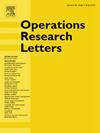二元聚类的聚类聚合注释
IF 0.8
4区 管理学
Q4 OPERATIONS RESEARCH & MANAGEMENT SCIENCE
引用次数: 0
摘要
我们考虑一个聚类聚集问题,即给定一组聚类,并希望找到一个与输入聚类不匹配的总和最小的聚类。在二元情况下(每个聚类都是一个双分区),这个问题在图灵约简下是np困难的。我们通过提供一个多项式时间的多一约简来加强这个结果。我们的结果还表明,除非指数时间假设不成立,否则不存在20 (n)⋅|I ' |O(1)时间算法来解决任何给定的具有n个元素的聚类实例I '。从积极的方面来看,我们证明了这个问题相对于输入聚类的数量是固定参数可处理的。本文章由计算机程序翻译,如有差异,请以英文原文为准。
A note on clustering aggregation for binary clusterings
We consider the clustering aggregation problem in which we are given a set of clusterings and want to find an aggregated clustering which minimizes the sum of mismatches to the input clusterings. In the binary case (each clustering is a bipartition) this problem was known to be NP-hard under Turing reductions. We strengthen this result by providing a polynomial-time many-one reduction. Our result also implies that no -time algorithm exists that solves any given clustering instance with n elements, unless the Exponential Time Hypothesis fails. On the positive side, we show that the problem is fixed-parameter tractable with respect to the number of input clusterings.
求助全文
通过发布文献求助,成功后即可免费获取论文全文。
去求助
来源期刊

Operations Research Letters
管理科学-运筹学与管理科学
CiteScore
2.10
自引率
9.10%
发文量
111
审稿时长
83 days
期刊介绍:
Operations Research Letters is committed to the rapid review and fast publication of short articles on all aspects of operations research and analytics. Apart from a limitation to eight journal pages, quality, originality, relevance and clarity are the only criteria for selecting the papers to be published. ORL covers the broad field of optimization, stochastic models and game theory. Specific areas of interest include networks, routing, location, queueing, scheduling, inventory, reliability, and financial engineering. We wish to explore interfaces with other fields such as life sciences and health care, artificial intelligence and machine learning, energy distribution, and computational social sciences and humanities. Our traditional strength is in methodology, including theory, modelling, algorithms and computational studies. We also welcome novel applications and concise literature reviews.
 求助内容:
求助内容: 应助结果提醒方式:
应助结果提醒方式:


